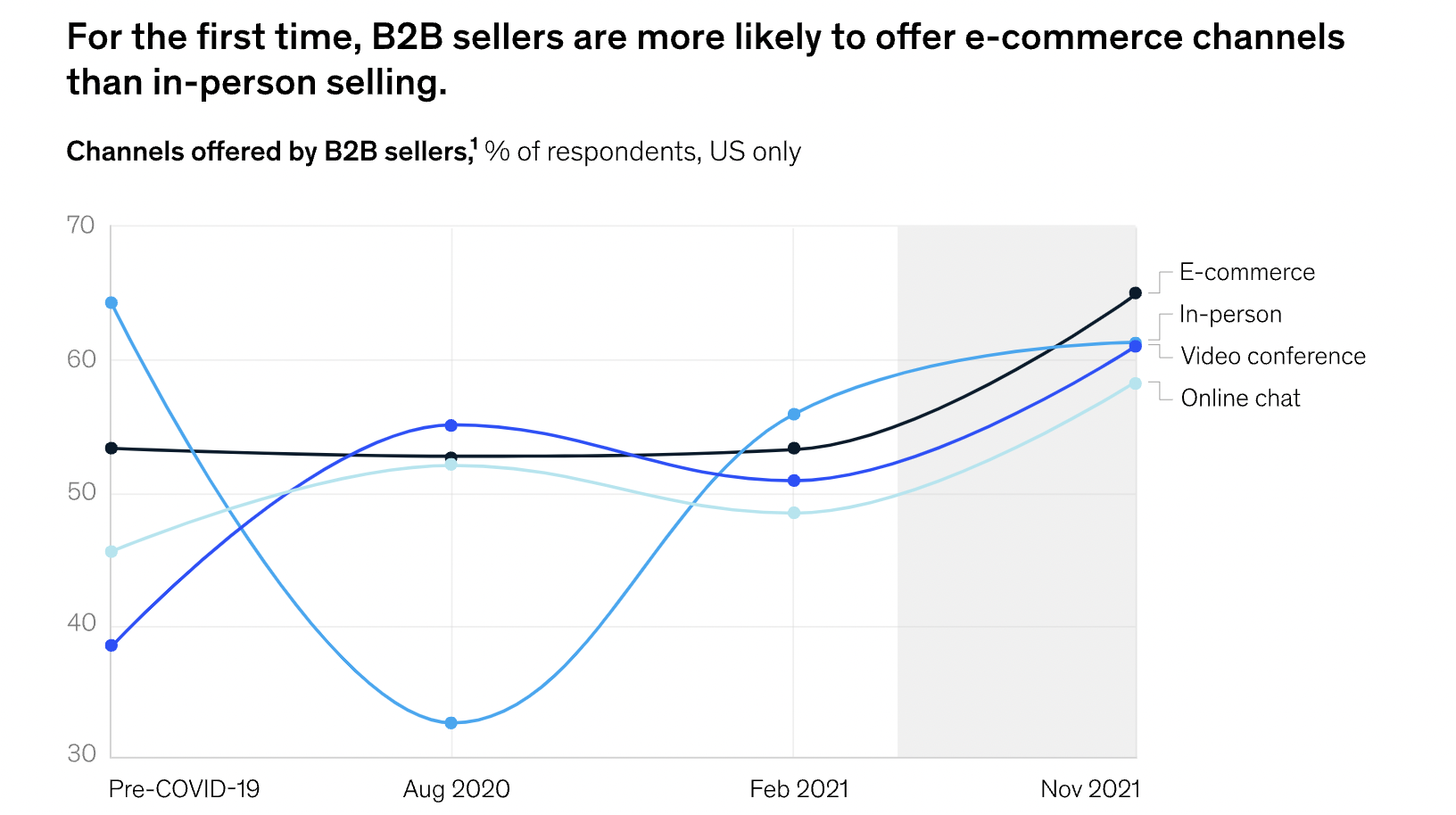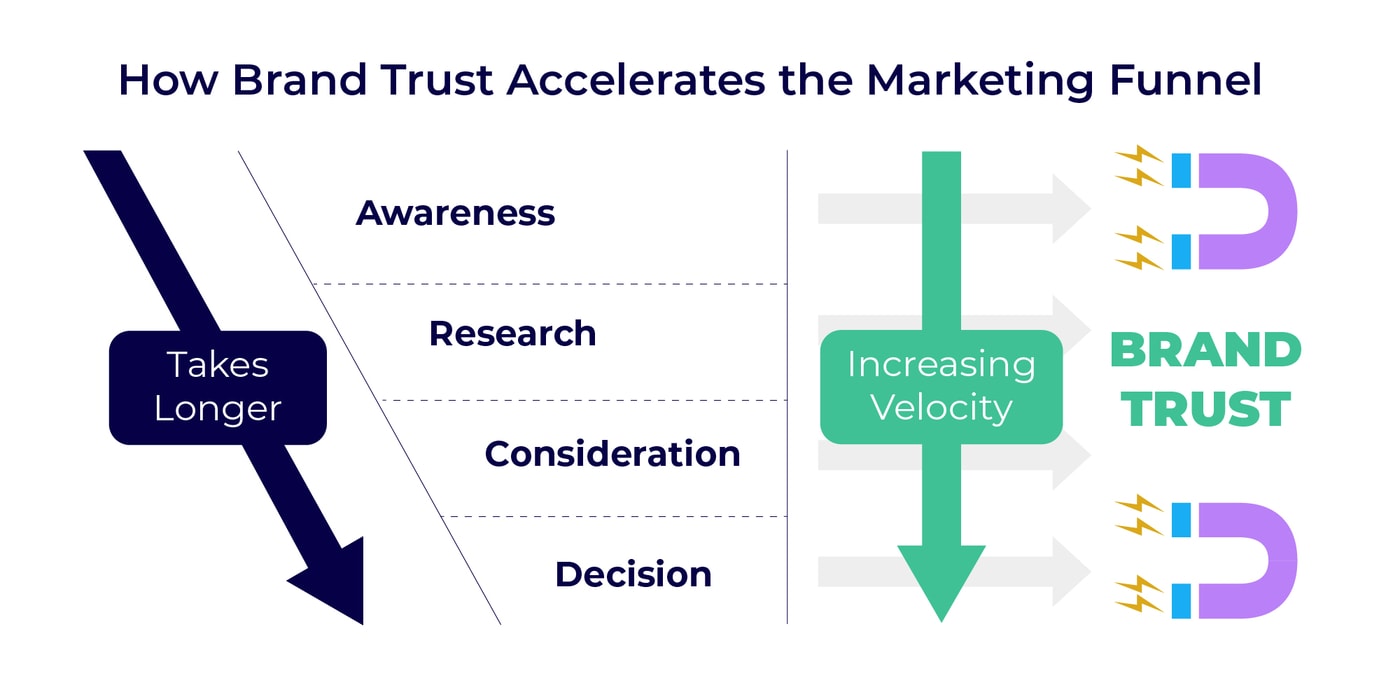According to McKinsey, in late 2021 e-commerce surpassed in-person sales as the most popular channel for B2B sellers. While the lockdowns imposed by a worldwide pandemic certainly accelerated this trend, the shift was inevitable. Like their consumer counterparts, B2B buyers increasingly expect their suppliers to offer e-commerce options. And vendors are responding en masse.
An astonishing 65% of B2B companies now offer e-commerce, compared to 53 percent at the beginning of 2021.

But while how B2B buyers buy is changing, what makes them pull the trigger on a purchase has not.
It's still, and will always be, trust.
B2B buyers have to trust that they are making the right decision—in the face of stakes than are even higher than for most B2C purchases.
Because while consumers may fear experiencing buyer's remorse for making the wrong choice in a car, refrigerator or plumber, B2B buyers often have a greater fear—that a poor decision will embarrass them in front of their colleagues or boss, and perhaps even have a negative impact on their careers.
The Key to B2B E-Commerce Is Trust
Let me tell you a story. Years ago, I was an IT director for a Global 100 telecom and internet provider. I oversaw the company’s IT software architecture and development in the U.S. And given the company had grown rapidly—acquiring over 60 companies of various sizes in a few short years—my team was always racing to absorb or migrate the legacy systems and data of the acquisitions.
Our own homegrown data integration framework—an impressive feat of software engineering though it was—was hard-pressed to keep up. I had to find a reliable commercial off-the-shelf package that would allow fast, simple, and secure systems and data integration to give the business the data it desperately needed.
And it couldn’t take years to deploy or break the bank.
I didn't know where to start. And I didn't know who I could trust.
I wasn’t buying a new washing machine. I was about to make a purchasing decision that, if not done carefully, could cost me my job, not to mention potentially crippling the back office and provisioning capabilities of a major company.
I ultimately picked a vendor I trusted—trust that took time to build in direct one-on-one interactions with salespeople. There were phone calls, RFPs, in-person visits, demos, more visits, calls with analysts, just to name a few of the hoops I went through.
From Trusting Salespeople to Earning Trust Online
It's not like that anymore. B2B buyers, like B2C buyers before them, do the vast majority of their research online today. If they deal with a salesperson at all, it's after they've made their decision or narrowed their choice down to a small consideration set.
According to McKinsey's numbers, B2B customers of every size and industry prefer vendors that offer omnichannel purchase options. They want to be able to engage with vendors through self-service, remote, and (yes) in-person modes at any time of day. In short, if you sell your wares to other companies and you don’t offer at least some e-commerce options, your customers and prospects may switch to a supplier who does.
The truth is that decision-makers for B2B purchases—be they palettes of packing boxes, office supplies, integrated microchips, or enterprise software—are people just like any other consumer. They want as many of the advantages offered by omnichannel sales experiences as possible, even if they can’t always whip out a credit card to finalize the purchase.
Anyone can purchase cloud services and software online from Amazon, Google, and thousands of others without any salesman calling.
Heck, today I could probably license that IT systems integration software I selected years ago, completely online as a B2B SaaS product.
I would still need to find a trusted path to the vendor I wound up choosing. I would just find it online today.
Building Brand Trust To Enable B2B e-Commerce To Flourish
My friend and colleague Laurie Lane recently shared the story about how brand trust figured into her selection of a crib mattress for her first child. This is one of the best accounts I’ve read about the importance of providing a variety of trust signals online, including online reviews, certifications of product safety, endorsements by social media influencers and celebrities, and more.
You may be thinking, “Les, we aren’t talking about buying a mattress online here.” That’s true. We’re talking about the kind of corporate B2B purchase that can demand a hefty price tag. And that includes those that no longer require direct sales as a primary channel and can be made via an e-commerce site.
Establishing brand trust online may be even more critical for B2B technology companies than their B2C counterparts.
Even when a company has already budgeted to buy a solution (like my former company), the selection and approval process for costly purchases can take months or even years. Just think what advantages a vendor would have had if it had gotten my attention and earned my trust earlier in the process—if I was already aware of its brand, reputation, and what it stood for before the sales process even began?
That's why we say that brand trust accelerates the buying process at every stage of the marketing funnel.

And if the vendor provided e-commerce options to at least start the process online, or to allow purchases of add-on services after a major purchase, so much the better.
And consider this: a B2B tech vendor might sell one or two units of a big-ticket product for every 10,000 units or more of a consumer good. B2B companies simply cannot afford to let those sales go to a competitor simply because they have more actively worked to earn buyers’ trust.
Use These Website Trust Signals to Help Complete the Sale
So, how do you convince B2B buyers to trust you when they are considering purchasing from you online?
There are a multitude of ways B2B companies can build brand trust, not all of which I can mention in a short blog post. However, since we’ve looked at the blossoming of e-commerce in B2B, especially in technology, let’s focus here on some elements of trust-centered web design you can incorporate into your site.
Here are just a few:
- Professional design – You should look like a respectable business, not a pyrotechnic show.
- No confusion – Provide clean and clear navigation without unexpected actions and links.
- No tricks - Don’t overuse popups and flashy banners that scream “risky” or “salesy.”
- No waiting – Ensure fast page loading not only because visitors’ attention spans are short but because Google considered this a factor in ranking search results.
- High-quality content – Ensure visitors know they’ve come to the right place and that you understand their needs without being salesy.
- An authentic About page – Tell your story in human terms that make you approachable.
- Testimonials – First-hand endorsements from satisfied customers are key to trust.
- Case studies – Full-blown customer success stories highlight each use case of your offerings so visitors “see themselves.”
- Embedded reviews – Reviews from sites like TrustRadius, G2, Clutch, and Glassdoor provide much-needed third-party validation.
- Personalization – Deliver tailored experiences based on behavior (without being creepy).
You can find a list of nearly 40 website trust signals and 77 online trust signals at the Trust Signals website.
Final Thoughts
Today’s B2B buyers have far more of what I lacked 10 to 15 years ago when I was one of them: information about you and your brand.
The right kinds of information will act as a trust breadcrumb path, guiding your future buyer, nurturing them with helpful tips, showing the value of dealing with your brand, and convincing them that you’re the right choice—when they’re ready to buy.

 7 min read
7 min read





 2 min read
2 min read

